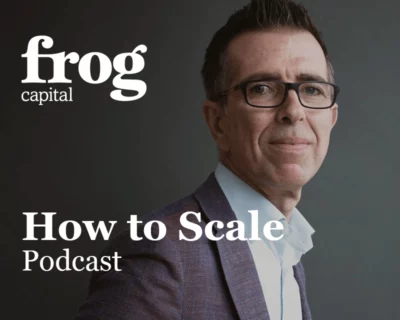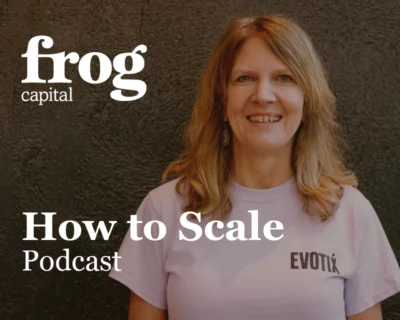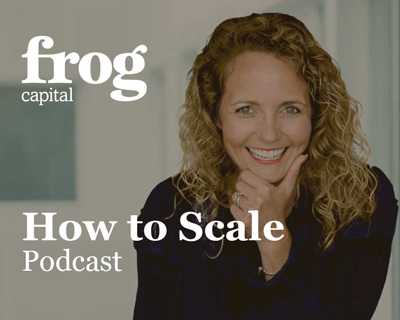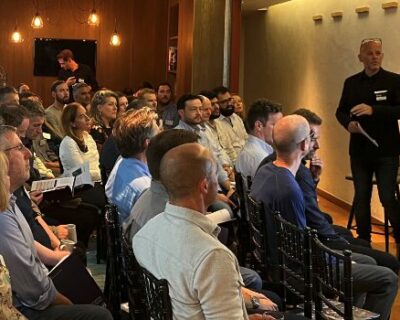Delivery covers everything required to provide the quality product or service that customers will rave about and result in them remaining loyal. The basics will already be in place for a scale-up business but through the scale-up phase there will be more strain and therefore more need to proactively improve key areas such as:
- Customer feedback loops to prioritise product development and optimise retention
- Departmental structures, reporting lines and responsibilities (Customer Success, Growth Hacking teams, OKRs)
- Support functions (Marketing, HR, IT, Sales admin support, quality control, Finance/Reporting)
At Frog, we have significant experience with operations including product development, taking account of market and competitor developments to ensure our companies keep one step ahead. Over time, it will become likely that a COO or operationally experienced CFO is required to maintain the quality and speed of execution, whilst the CEO’s attention is better invested in corporate profiling, key customers, strategy and team development. As Ben Horowitz says in The Hard Thing About Hard Things: “Don’t put it all on your shoulders – as CEO, you can’t share everything, but remember that you don’t have to bear every burden alone. Muster as many brains as possible to attack a problem”. He also warns against incurring “management debt”; making easier short-term people decisions which have long-term consequences. A core part of our Scale up methodology is “Scale-up CEOs plan their recruitment at least a year ahead” and we will be looking ahead more than a CEO will have time to in order to ensure this is on the agenda early enough to be proactive not reactive.
As the leadership team develops, it is essential for successful scaling of the operations that there is good communication and alignment on approach. Agreeing on priorities is difficult when short-term imperatives are so demanding, but the time and resources still have to be made available for building the infrastructure (including people, processes and resources) to secure long-term growth, enhanced value and resilience. This is not optional, it is fundamental to your chances of success.
The scale-up business will need to develop departmental structures and clear reporting lines and responsibilities. Some entrepreneurs see this as unnecessarily bureaucratic but the only alternative is tighter control from a more stretched leadership team which empirical evidence shows is detrimental to value creation (as discussed in “The Throne Vs. The Kingdom: Founder Control and Value Creation In Start-ups”, Noam Wasserman, Strategic Management Journal 2017). Support functions often only receive investment as a reaction to an inevitably costly incident. We would always advise a timely building of the support functions (Marketing, HR, IT, Sales admin support, quality control, Finance/Reporting) to prevent incidents which can slow overall momentum as resources are diverted to fix them.
A responsibility of the CFO or COO through the forecasting processes is to identify the bottlenecks to growth early and get a plan to resolve them over time. Financial models need to be connected to the reality of the world where businesses do not evolve in nice straight lines but have to make step-changes in approach which can sometimes stall progress or even take productivity backwards in a department before the benefits come through. These can be easily managed within a growing business as long as there is good preparation and planning.
Throughout the scale-up phase, it is important to understand the inter-connectedness of building blocks; for example, investing ahead of sales requirement to ensure support and execution but first ensuring the product development and operational capacity can support even the most optimistic increased sales demands. A clear product development road map, which takes into account market and competitor developments, needs to be a fundamental part of the planning for operations requirements.
Areas that will need to develop through the scale up phase are:
- people (changing skill sets, succession planning, training, development)
- culture (make sure it encourages open debate, change, and focus on delivering)
- systems (clearly set capacity triggers to change/upgrade)
- organisational structure (esp. the creation of proper management levels)
The process needs to be driven by good, timely decision making based on good data which can be a clear added value of investing early in the finance function (e.g. providing profitability by product, market, channel etc.). In The Lean Start-up, Eric Ries talks about validated learning and scientific testing that applies from start-up to mature business. This involves good preparation for new initiatives, such as laying out assumptions and success measures, so that the results can be accurately assessed to ensure they provide good data for decision making. An understandable but avoidable mistake at the scale-up phase is to change too many things at once without clarity on expected output, which then makes it impossible to assess which worked and which didn’t. This leads to all being retained just in case they make the difference while future innovations build on this inefficiency of resources allocation. Decision making in all areas needs to be much clearer than that and you must not be afraid to push people out of their comfort zones and take real accountability.
Ben Horowitz says, “Every really good, really experienced CEO […] tends to opt for the hard answer to organisational issues […] They’ll ruffle the feathers”. Building the right delivery platform and team will not be easy but at Frog we know it will make all the difference in successfully delivering the vision the CEO is advocating.











